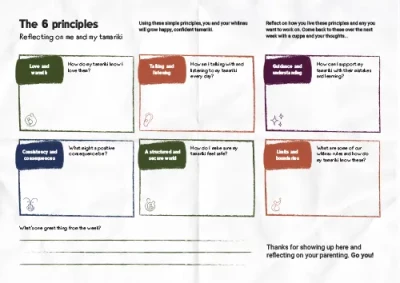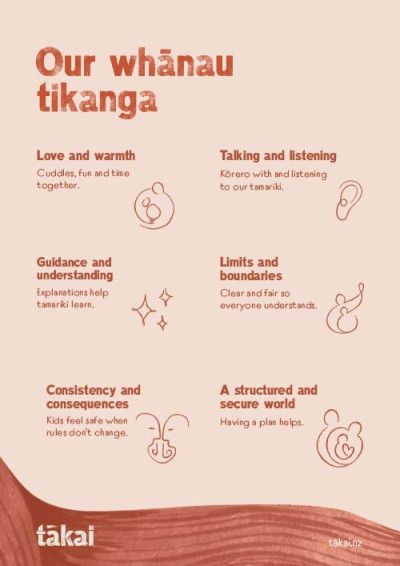
Six principles of effective discipline
Key principles for managing kids' difficult behaviour without having to hit or yell.
In 2004 the Children’s Issues Centre, University of Otago, and the Office of the Children’s Commissioner published a research report called The Discipline and Guidance of Children, which revealed 6 key principles for effective discipline.
The principles provide a foundation for helping parents manage kids’ difficult behaviour without having to hit or yell.
Although based on relationships between parents and children, the 6 principles are also effective for building positive relationships with anyone, anywhere – home, early childhood centres, classrooms, and workplaces.
The 6 principles
Love and warmth
Right from birth, love and warmth builds trust and positive self-esteem. Respectful relationships are at the heart of effective discipline and positive parenting.
Te aroha me te mahana – love and warmth
Talking and listening
Good things come when we talk/sign, watch, and listen to kids and give them clear messages.
Te kōrero me te whakarongo – talking and listening
Guidance and understanding
When children understand why we want something done they’re more likely to do it. Explaining works better than orders or threats.
Te ārahi me te māramatanga – guidance and understanding
Limits and boundaries
Clear and simple rules that children understand, work best. Rules keep things safe and fair for everyone.
Te tūāpapa mō te tika me te hē – limits and boundaries
Consistency and consequences
Children feel safe when the rules don’t change. Consequences for misbehaviour should be:
- related directly to what has happened
- reasonable for their developmental age and understanding
- respectful; firm and fair, not humiliating.
Te mahi pono – ngā hua me ngā hapa – consistency and consequences
A structured and secure world
Kids feel happy and relaxed when they know what’s happening.
Plan ahead for possible challenges, for example, take snacks with you to the supermarket
Model behaviour that you want kids to copy – don’t throw an adult tantrum when things get frustrating for you.
Te hanga ao tōtika, ao haumaru – structured and secure world
 pdf 1.5 MB
pdf 1.5 MB












